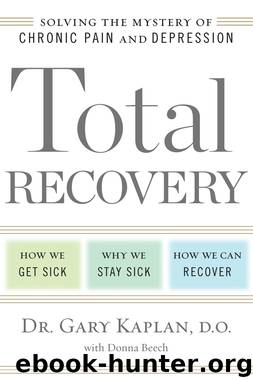Total Recovery by Gary Kaplan

Author:Gary Kaplan
Language: eng
Format: epub
Publisher: Rodale
Published: 2014-10-14T16:00:00+00:00
GUT FEELINGS
We now know that our intestinal tract has 100 million nerves—more than our spinal cords or peripheral nervous systems. With this radically new understanding, scientists have tentatively begun to refer to it as the body’s second brain.
As Michael Gershon, MD, explains in his book The Second Brain, the intestinal tract is far more independent than anyone had realized. It is even equipped with its own senses and reflexes.3
Surprisingly enough, our digestive systems manufacture just as many neurotransmitters as our brains. With the advent of “designer drugs”—such as selective serotonin reuptake inhibitors (SSRIs)—we have come to think of depression, anxiety, and insomnia in relation to the amount of serotonin circulating in the brain. Only recently has it become apparent that 95 percent of the body’s serotonin is manufactured not in the brain, but in the gut.4
Now it makes sense that the side effects of SSRIs often include intestinal problems.5
In America more than two million people have irritable bowel syndrome (IBS), which may be caused, in part, from too much serotonin in the intestinal tract. As Adam Hadhazy points out in Scientific American, this means IBS—like other diseases caused by an imbalance of neurotransmitters in the gut—could almost be considered “mental illnesses” of the second brain.6
IBS may also signal an inflammatory process in the spinal cord or brain itself. An emergent theory on the cause of IBS is that it is a form of central sensitization. Inflammation in the spine increases sensitivity of the nerves controlling the muscles that line the intestinal tract and ensure the smooth flow of food throughout our digestive system. When the nerve signals from the spinal cord and brain to the intestines are disrupted, it can cause the intestinal muscles to spasm, resulting in pain and cramping. The muscles respond by becoming overactive (diarrhea) or underactive (constipation).
As researchers have turned their attention to serotonin levels in the gut instead of in the brain, it has led to even more surprises. In a study of rodents at Columbia University Medical Center, scientists found that when they gave rodents with osteoporosis a drug that inhibited the release of serotonin in the gut, the disease disappeared. Gerard Karsenty, MD, lead author of the study and chair of the Department of Genetics and Development at Columbia, admitted, “It was totally unexpected that the gut would regulate bone mass to the extent that one could use this regulation to cure—at least in rodents—osteoporosis.”7
Dr. Gershon says, “We have never systematically looked at [the intestinal tract] in relating lesions in it to diseases like we have for the [central nervous system].”8 Once we have had time to investigate the implications of the second brain, important connections to diseases will be linked to the state of our gut.
We know that problems in the intestinal tract can go much further than heartburn and indigestion or constipation. Crohn’s disease, IBS, and ulcerative colitis also arise from imbalances in the gut.9 Early studies have suggested that imbalances in intestinal bacteria can cause “arthritis, diarrhea, autoimmune illness, B12
Download
This site does not store any files on its server. We only index and link to content provided by other sites. Please contact the content providers to delete copyright contents if any and email us, we'll remove relevant links or contents immediately.
Men In Love by Nancy Friday(5218)
Everything Happens for a Reason by Kate Bowler(4722)
The Immortal Life of Henrietta Lacks by Rebecca Skloot(4564)
Why We Sleep by Matthew Walker(4419)
The Sports Rules Book by Human Kinetics(4367)
Not a Diet Book by James Smith(3395)
The Emperor of All Maladies: A Biography of Cancer by Siddhartha Mukherjee(3133)
Sapiens and Homo Deus by Yuval Noah Harari(3051)
Day by Elie Wiesel(2769)
Angels in America by Tony Kushner(2638)
A Burst of Light by Audre Lorde(2582)
Endless Forms Most Beautiful by Sean B. Carroll(2462)
Hashimoto's Protocol by Izabella Wentz PharmD(2360)
Dirty Genes by Ben Lynch(2303)
Reservoir 13 by Jon McGregor(2282)
Wonder by R J Palacio(2193)
And the Band Played On by Randy Shilts(2179)
The Immune System Recovery Plan by Susan Blum(2051)
Stretching to Stay Young by Jessica Matthews(2021)
